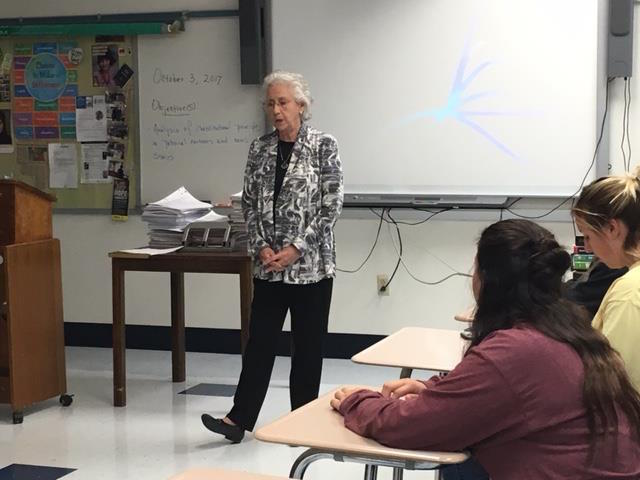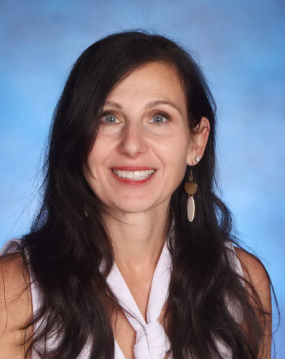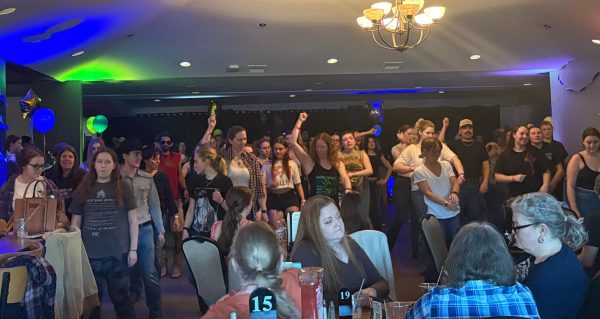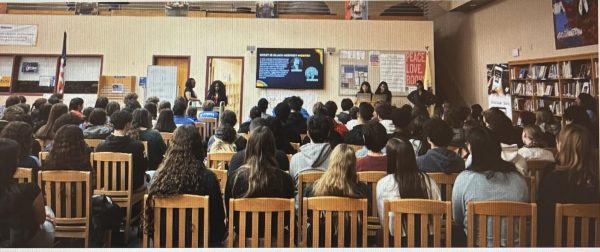Holocaust Survivor Tells Her Tale
Holocaust survivor and published author Maud Dahme visited Mrs. Debra Rokosny’s Genocide classes in mid-October to discuss her life during the Holocaust, one of the darkest times in human history.
Dahme opened her lecture by detailing what life was like during her childhood. She recalled her hometown being bombed by Allies and being treated differently due to her beliefs.
“My mother couldn’t even go to the local stores.” Dahme told students.
Dahme also recalled a letter being read aloud to the Jews in their Synagogue about going to a “better place.”
“We’re going to take you away from all the war scene,” Dahme recalled the letter said, “and we’re going to have trains on this day leaving the train station and here’s a list of items you should bring with you.”
Dahme said Jews were not allowed to visit with any non-Jewish families, but snuck into a family friend’s house to ask about the trains. They explained that they were working with the underground resistance and secured the same letter read in the synagogue.
Dahme’s family asked what they should do, and they told them, “We’re not sure where these trains are going, but do not go on the train.”
“He said, ‘we’ve been going around to Christian families all over the Netherlands asking them if they would take and hide Jewish children if the need should arise. I have an address, a couple that are willing to take your children,’” Dahme explained.
By this time, Dahme’s parents realized they were in trouble.
They heard of Catholic families bringing in children to hide during the war, so they decided to bring Dahme and her sister to a compassionate Catholic family on a farm.
“The couple that took us in sat me down and told me, on that very first night, why my sister and I were really there,” Dahme said. “That I am to tell no one I am Jewish, and that I had a new name also.”
Later in that year, the man who originally took Dahme into hiding had a heart attack and they were moved to another family who took them in.
After someone leaked Dahme’s whereabouts they were forced to move again.
Dahme and her sister were placed in a small fishing village, with almost nothing to eat, other than eel.
By June, 1944, Allied troops started to move north and into Germany, and soon thereafter, Canadian soldiers came in with large tanks to free the town.
“So now we were free, but there had been no contact with my parents,” Dahme said. “The people who took us in had no idea what to do with us, so they sent us back to our ‘aunt’ on the farm to see if their family survived. So, we went back to the farm and we found out my parents did survive.”
After Dahme and her family were reunited, they eventually came to America to start a new life. Her parents both got jobs which allowed Dahme to continue her schooling.
Dahme eventually graduated high school and began a somewhat normal life.
Rokosny was pleased to have Dahme speak to her students and feels the Holocaust is still relevant to modern history.
“I think it’s important for students to learn about the Holocaust and other genocides, because genocides are still happening; it is not just a thing of the past,” she said. “By studying the Holocaust, students become aware of the importance of making choices and come to realize that one person can make a difference.”





